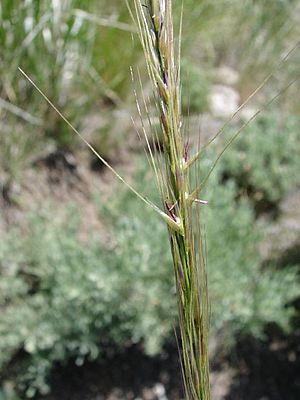Columbia needlegrass facts for kids
Quick facts for kids Columbia needlegrass |
|
|---|---|
 |
|
| Conservation status | |
| Scientific classification |
|
| Kingdom: | Plantae |
| Clade: | Tracheophytes |
| Clade: | Angiosperms |
| Clade: | Monocots |
| Clade: | Commelinids |
| Order: | Poales |
| Family: | Poaceae |
| Subfamily: | Pooideae |
| Genus: | Achnatherum |
| Species: |
A. nelsonii
|
| Binomial name | |
| Achnatherum nelsonii (Scribn.) Barkworth
|
|
| Script error: The function "autoWithCaption" does not exist. | |
| Synonyms | |
|
Stipa nelsonii |
|
Script error: No such module "Check for conflicting parameters".
Achnatherum nelsonii is a type of grass that has a few common names. You might hear it called Columbia needlegrass, subalpine needlegrass, or western needlegrass. This grass grows naturally in western North America. You can find it from Yukon and British Columbia in Canada, all the way down to California and Texas in the United States.
Contents
What is Columbia Needlegrass?
This grass is a perennial, meaning it lives for more than two years. It grows in leafy bunches that can reach up to 175 centimeters (about 5.7 feet) tall. Its roots can go almost a meter (about 3 feet) deep into the soil. The plant stays green for most of the growing season, sometimes even until the first snowfall.
The part of the grass that holds the seeds is called the inflorescence. For Columbia needlegrass, this is a narrow cluster of flowers. These flower branches stand upright or lie close to the main stem.
Where Columbia Needlegrass Lives
This grass lives in many different places across western North America. It is a very important grass in several areas. For example, it is a dominant grass in shrubsteppe areas of Colorado. It also grows widely in forest and woodland ecosystems in Arizona and New Mexico.
In some places, Columbia needlegrass is an indicator of a healthy, stable ecosystem. This means its presence shows that the area is a climax community. This is true for sagebrush and pinyon-juniper woodland areas. In northern Alberta, it shows that a true dry grassland exists. On the Wasatch Plateau in Utah, it indicates a natural subalpine habitat.
How it Helps After Wildfires
Columbia needlegrass is very strong. In New Mexico, it grows back quickly after a wildfire. This helps the land recover faster. It can also handle a lot of grazing by animals. It is one of the last plants to be eaten too much. It is also one of the first to recover when animals stop overgrazing an area.
Why Animals Eat This Grass
Many different animals, both farm animals and wild animals, eat Columbia needlegrass. They especially like to eat it when it is young and tender. However, as the grass grows, its seeds become hard and pointed. These sharp seeds can get stuck in animals' mouths or ears. Because of this, animals try to avoid eating the grass once the seeds have developed.
 | William Lucy |
 | Charles Hayes |
 | Cleveland Robinson |


